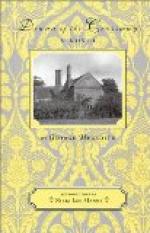’If the public were a perfect instrument to strike on, I should be tempted to take the wonderful success of my Princess at her first appearance for a proof of natural aptitude in composition, and might think myself the genius. I know it to be as little a Stradivarius as I am a Paganini. It is an eccentric machine, in tune with me for the moment, because I happen to have hit it in the ringing spot. The book is a new face appealing to a mirror of the common surface emotions; and the kitchen rather than the dairy offers an analogy for the real value of that “top-skim.” I have not seen what I consider good in the book once mentioned among the laudatory notices—except by your dear hand, my Emmy. Be sure I will stand on guard against the “vaporous generalizations,” and other “tricks” you fear. Now that you are studying Latin for an occupation—how good and wise it was of Mr. Redworth to propose it!— I look upon you with awe as a classic authority and critic. I wish I had leisure to study with you. What I do is nothing like so solid and durable.
‘The Princess Egeria’ originally (I must have written word of it to you— I remember the evening off Palermo!) was conceived as a sketch; by gradations she grew into a sort of semi-Scudery romance, and swelled to her present portliness. That was done by a great deal of piecing, not to say puffing, of her frame. She would be healthier and have a chance of living longer if she were reduced by a reversal of the processes. But how would the judicious clippings and prickings affect our “pensive public”? Now that I have furnished a house and have a fixed address, under the paws of creditors, I feel I am in the wizard-circle of my popularity and subscribe to its laws or waken to incubus and the desert. Have I been rash? You do not pronounce. If I have bound myself to pipe as others please, it need not be entirely; and I can promise you it shall not be; but still I am sensible when I lift my “little quill” of having forced the note of a woodland wren into the popular nightingale’s—which may end in the daw’s, from straining; or worse, a toy-whistle.
’That is, in the field of literature. Otherwise, within me deep, I am not aware of any transmutation of the celestial into coined gold. I sound myself, and ring clear. Incessant writing is my refuge, my solace—escape out of the personal net. I delight in it, as in my early morning walks at Lugano, when I went threading the streets and by the lake away to “the heavenly mount,” like a dim idea worming upward in a sleepy head to bright wakefulness.
’My anonymous critic, of whom I told you, is intoxicating with eulogy. The signature “Apollonius” appears to be of literary-middle indication. He marks passages approved by you. I have also had a complimentary letter from Mr. Dacier:




